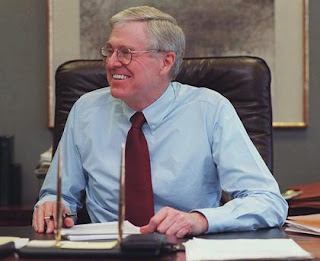As someone
in the financial industry personal finance is something that is always
interesting. If you are really interested in how even the rich can go poor I
suggested Robert Frank’s “High Beta Rich” which has great stories of how even
the top .01% can become the bottom 99% or even in some cases bankrupt. When I
saw this story about Larry Ellison increasing
his line of credit to $4.5 billion I began to wonder why he even has a line of
credit. Basically Ellison was using Oracle stock (company he founded) as
collateral in order to pay for things he shouldn’t be buying (an island for
example). According to Bloomberg Billionaires Index Ellison is worth around $38
billion. Larry Ellison is one of the highest paid CEO’s. For the past fiscal
year Ellison made $96 million ($90.7 was due to stock option awards which few
people actually know take years to get since they are actually restricted stock
where an executive may have to wait 3 to 7 years even before they can cash out
the options). Essentially 95% of the stock price is tied not the short term
performance of Oracle but the long-term (3-7 year period) after the shares are
awarded that matter. People forget the options Oracle gave Ellison could be
worth less than the $90.7 quoted in the future if Oracle were to tank or not
create shareholder wealth. According to this WSJ article Ellison between 2001
and 2010 made roughly $1.84 billion being the CEO of Oracle. If I do a
performance chart of ORCL (Oracle) over the same period of time the stock was
down close to 16%. Is Mr. Ellison overpaid?
It
seems though that even though Larry Ellison is raking in the dough he is also
spending a lot of it as well. Usually people never change (even if they
say they have). I found this
great article published
in 2006 from the SF Gate detailing Ellison’s ridicioulous spending (even
by billionaire standards). Phillip Simon who was Ellison’s accountant in 2002
told Ellison “I’m worried, Larry…I think it’s imperative that we start to
budget and plan”. Apparently Ellison was living the really good life. He was
spending $20 million on his “lifestyle”, $75 million on interest, $25 million
on a villa in Japan, $194 million on a new yacht, $80 million on the American
Cup and a random $12 million on UAD (which no one seems to know what it
is). He did build an insane $200 million Japanese style house. He is also
charitable and wanted to increase the funding from $35 million to $100 million
per year. This is all of course excluding the money he spent on Gulfstream and
Cessna jets, cars (McLaren F1 car), Armani suits, and financing all these
purchases by borrowing against his Oracle stock. I just hope Larry doesn’t one
day face a margin call. Keep in mind at the time Ellison was worth closer to
$17 billion. Not only was Ellison spending a lot but breaking one of the first
rules of personal finance which is diversification. No one should have their
net worth tied to one stock no matter how high quality it is since you never
know what can happen in the future. Larry’s financial advisor was trying to
diversify him out of Oracle stock however Ellison was increasing his ownership
interest.
Ellison
started his company with only a dozen employees and had software that was being
used by credit card companies, hotels, and airlines to process transactions.
Now Oracle’s s software is used by over 70,000 government and commercial customers
and has 115,000 employees. Ellison was
no whiz kid in school either. He left the University of Illinois during finals
and ended up not taking them. He in fact remembers one exam where he just sat
for an hour because he knew he had to spend 3 hours answering the questions.
Larry did end up taking some physics classes at the University of Chicago which
seem to interest him and lead him to actually lead him to computer programming.
More of Larry’s story is told in the book “Softwar”.
Ellison
basically came from nothing to build a business that earns billions of dollars
per year. I admire this since he wasn’t given a business or just an inheritance
to build it. Although, Ellison has built a successful business there are still laws
of financial planning he has to follow like diversifying his stock, trying not
to use Oracle stock as collateral, and not spend so much. I just hope that
Ellison doesn’t end like other CEOs who financed themselves so much that they
lost everything.
























